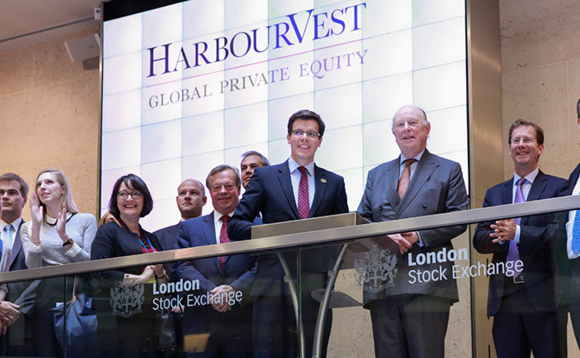
Private equity takes public turn

Today, HarbourVest’s fund Global Private Equity (HVPE) has moved from the specialist fund market to London Stock Exchange’s (LSE) main market, highlighting funds-of-funds' increasing tendency to access the public markets. Alice Murray reports live from LSE
As boldly predicted by Carlyle co-founder David Rubenstein at the SuperReturns conference in Berlin earlier this year, high-net-worth individuals and retail investors are to play an increasingly important role in private equity as developed economies move to give pension holders more control over their investments. Particularly in the US, where pension funds have long been a major contributor to private equity funds, the shift to defined contributions and growing scrutiny over the asset class's allocation of fees is likely to cause a reduction in commitments from these institutions. This development is forcing funds-of-funds in particular to consider new approaches to raising capital.
While many funds-of-funds have used the public markets as a way to feed capital into fund programmes, this somewhat sleepy part of the market is stirring into action. Indeed, today saw HarbourVest's publicly listed feeder vehicle moving to LSE's main market.
On the surface, the listing simply enables HVPE to change from a dual share class to a single ordinary share. Says Richard Hickman, associate director at HarbourVest, who has been overseeing the listing: "This is the key benefit for shareholders as it means they all get voting rights."
But the key to this move, as well as rewarding current shareholders with more say over the fund, is to allow the vehicle to increase its liquidity. Previously, HVPE had been listed on the Euronext in Amsterdam and in 2010 also joined the specialist fund market. While the dual listing initially offered some improvement in liquidity, according to Hickman, moving to the main market is the "next logical step" for the company.
"Since we first listed in Amsterdam in 2007, it has always been my aim as chairman to take the company to the main market"
Michael Bunbury, HarbourVest
Outside of placating asset managers who have been wary of HVPE's former uneven voting rights, the move also positions the vehicle alongside its peers including Electra Private Equity, Graphite Enterprise Trust and SL Capital Partners' Standard Life Private Equity Trust.
"It's vital to target more mainstream equity funds. Furthermore, it also gives us the opportunity to join the index after the first quarter; we may be eligible for the AllShare Index and potentially the FTSE 250," says Hickman. In order for HVPE to do that, it needs to pass liquidity tests to show that its trading volume averages 20,000 shares per day. "If we are liquid enough then we can benefit from significant extra demand from tracker funds," says Hickman.
Long and winding road
The vehicle has traversed a long and winding road so far to reach today's proceedings, having to reduce its US shareholding to less than 50%. Furthermore, HVPE has seen its fair share of shocks, having first listed on Euronext in 2007, right before the market tumbled. However, since joining the specialist fund market in 2010, HVPE has doubled its market cap, representing an 18% annual growth rate.
Speaking at the opening of the markets this morning, HarbourVest chairperson Sir Michael Bunbury said: "Since we first listed in Amsterdam in 2007, it has always been my aim as chairman to take the company to the main market. There have been a few rocks along the road, namely reducing its US ownership, which has since come under the 50% level. This is a new and exciting time for the company; it provides a modern means of exposure to private equity."
Following the move to the main market, HVPE will continue to not pay out dividends. "We are marketing this as a growth strategy; there is no natural yield so if we were paying our dividends we would be paying out from our capital and at the moment we need to keep our market cap high," explains Hickman. The vehicle currently has $135m on its balance sheet following GP distributions, which will be recycled back into HarbourVest programmes. Hickman says $400m of new commitments will be invested over the next five years.
HVPE's move comes hot on the heels of Apax's decision to list its investment vehicle Apax Global Alpha (AGA) on LSE. The IPO raised €300m and was oversubscribed. The vehicle's initial share price was 119.2 pence and at the time of writing stood at 120.75 pence.
Flotations buoyant
With two new vehicles joining LSE's main market in recent months, the listed private equity market is finally enjoying a more buoyant environment. With average discounts to NAV for listed vehicles hitting a dire 60% in 2009 according to LPEQ, that gap has narrowed dramatically to an average of 19% at the time of writing. While that discount still exists, and with more funds joining the main market, it could be that asset managers start piling into the space.
Listed private equity vehicles will undoubtedly be working harder than ever to educate asset managers on the private equity model, highlighting the opportunity for investors to access the high returns generated by an industry previously the reserve of institutions with enough clout to write bigger tickets. However, as the majority of listed private equity vehicles tend not to pay out dividends, it will only be those investors that can hold investments over the long term that will benefit from the gradual decline in discounts to NAV.
And while HVPE and Apax Global Alpha enable everyday investors some exposure to their underlying funds, it would seem so far the bulk of private equity firms attempting to tap into personal wealth have targeted the super-rich. Indeed, earlier this year, Blackstone launched its Total Alternatives Solution Advisors, where high-net-worths are able to commit minimum tickets of $250,000.
One major reason for targeting high-net-worths over retail investors is regulation and transparency concerns. Over in the US, where the majority of this activity is taking place, the Securities and Exchange Commission continues to battle with defining accredited investors as well as ways of protecting individuals' savings.
For the time being, back in Europe, those funds offering direct exposure to retail investors through public listings appear to be well received. Speaking on background, equity analysts covering HVPE believe it might take a while to see a material impact on the vehicle's share price, as the fund-managers market tends to move slowly. However, there are good drivers for HVPE, including the shift to being sterling denominated (it was previously in USD), which could see ISA and retail investors picking up shares as part of a long-term strategy.
Latest News
Stonehage Fleming raises USD 130m for largest fund to date, eyes 2024 programme
Multi-family office has seen strong appetite, with investor base growing since 2016 to more than 90 family offices, Meiping Yap told Unquote
Permira to take Ergomed private for GBP 703m
Sponsor deploys Permira VIII to ride new wave of take-privates; Blackstone commits GBP 200m in financing for UK-based CRO
Partners Group to release IMs for Civica sale in mid-September
Sponsor acquired the public software group in July 2017 via the same-year vintage Partners Group Global Value 2017
Change of mind: Sponsors take to de-listing their own assets
EQT and Cinven seen as bellweather for funds to reassess options for listed assets trading underwater








